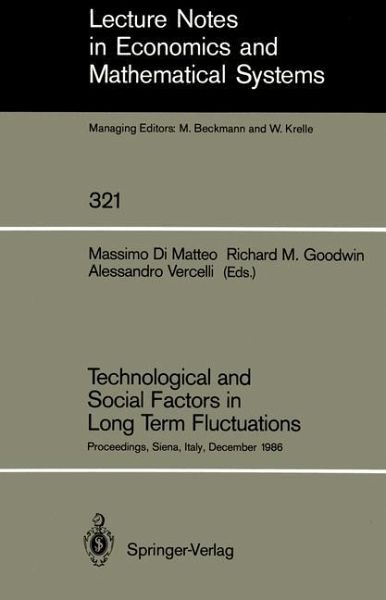
Technological and Social Factors in Long Term Fluctuations
Proceedings of an International Workshop Held in Siena, Italy, December 16-18, 1986
Herausgegeben: Di Matteo, Massimo; Goodwin, Richard M.; Vercelli, Alessandro

PAYBACK Punkte
39 °P sammeln!
This book includes the results of an International Workshop held at the Department of Political Economy of the University of Siena in December 1986. It focuses on the presentation, discussion, and comparison of two most interesting theories proposed for the explanation of long waves, namely the technological (neo-Schumpeterian) and the "social" approach. One of the main results that emerges is that the two approaches are not mutually exclusive and that an integrated theory of long waves is a feasible construction. The book consists of three parts. The first comprises theoretical approaches including also contributions shaped in the neo-Marxist and neoinstitutional perspectives. In the second part, applied analyses are gathered, ranging from case studies to econometric works on both underdeveloped and industrialized countries. Finally, contributions on economic history, methodological aspects and history of economic doctrines are also presented.
1. The Idea behind the workshop was that of calling attention to the necessity of studying long term tendencies In economic growth. We believe that actual growth processes In capitalistic economies are not smooth phenomena and also that the evolution of the economy Is characterized by long term fluctuations as well as by trade cycles. It Is now common place to argue that this point of view was revived after 1973 In consequence of the economic difficulties experienced by Industrialized countries while It has a much older origin as Its roots can be pushed back at least to the Great Depression of the 1930's. In preparing this workshop we selected two main approaches (as reflected In the title of this book) that have been proposed In the last ten years to deal with the causes of long term fluctuations, namely the ··technologlcal"' (or neo SchumpeterlanLapproach and the "'social"' approsch. What follows Is simply a rough characterization of the existing theoretical positions and It Isnot meant to be an exhaustive one. The Interested reader will Immediately see that there are many differentiated positions by looking at the arguments contained In each contribution.














